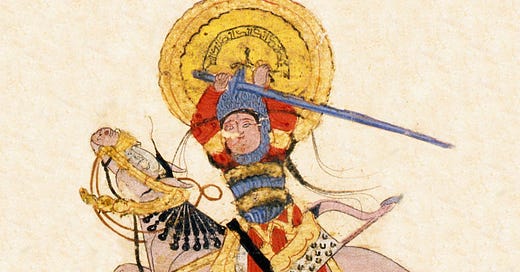This one started life as a bargain purchase at The History Bookshop in Salisbury (see the weekly digest from two Saturdays ago) and it came in the shape of a book by Amin Maalouf. Originally published as Les croisades vues par les Arabes in the eighties, a translation eventually appeared in 2006, entitled The Crusades through Arab Eyes. He starts it off like this:
Baghdad, August 1099.
Wearing no turban, his head shaved as a sign of mourning, the venerable Abu Sa'ad al-Harawi burst with a loud cry into the spacious diwan of the caliph al-Mustazhir Billah, a throng of companions, young and old, trailing in his wake. Noisily assenting to his every word, they, like him, offered the chilling spectacle of long beards and shaven skulls. A few of the court dignitaries tried to calm him, but al-Harawi swept them aside with brusque disdain, strode resolutely to the centre of the hall, and then, with the searing eloquence of a seasoned preacher declaiming from his pulpit, proceeded to lecture all those present, without regard to rank.
'How dare you slumber in the shade of complacent safety', he began, 'leading lives as frivolous as garden flowers, while your brothers in Syria have no dwelling place save the saddles of camels and the bellies of vultures? Blood has been spilled! Beautiful young girls have been shamed, and must now hide their sweet faces in their hands! Shall the valorous Arabs resign themselves to insult, and the valiant Persians accept dishonour?'
'It was a speech that brought tears to many an eye and moved men's hearts', the Arab chroniclers would later write. The entire audience broke out in wails and lamentations. But al-Harawi had not come to elicit sobs.
'Man's meanest weapon', he shouted, 'is to shed tears when rapiers stir the coals of war.'
If he had made this arduous trip from Damascus to Baghdad, three long summer weeks under the merciless sun of the Syrian desert, it was not to plead for pity but to alert Islam's highest authorities to the calamity that had just befallen the faithful, and to implore them to intervene without delay to halt the carnage. 'Never have the Muslims been so humiliated', al-Harawi repeated, 'never have their lands been so savagely devastated.' All the people travelling with him had fled from towns sacked by the invaders; among them were some of the few survivors of Jerusalem. He had brought them along so that they could relate, in their own words, the tragedy they had suffered just one month earlier.’
A thirteenth century illustration of one of Kilij Arslan’s warriors (Wikipedia)
Al-Harawi was having a complete meltdown about the fall of Jerusalem, which had taken place on 15th July after a forty-day siege. He and his companions had been through a horrific ordeal:
‘The exiles still trembled when they spoke of the fall of the city: they stared into space as though they could still see the fair-haired and heavily armoured warriors spilling through the streets, swords in hand, slaughtering men, women, and children, plundering houses, sacking mosques. Two days later, when the killing stopped, not a single Muslim was left alive within the city walls. Some had taken advantage of the chaos to slip away, escaping through gates battered down by the attackers. Thousands of others lay in pools of blood on the doorsteps of their homes or alongside the mosques. Among them were many imams, 'ulama', and Sufi ascetics who had forsaken their countries of origin for a life of pious retreat in these holy places. The last survivors were forced to perform the worst tasks: to heave the bodies of their own relatives, to dump them in vacant, unmarked lots, and then to set them alight, before being themselves massacred or sold into slavery.’
This account feels so visceral, and the Arabs involved are so shocked, that it got me thinking, what must it have been like for those involved to wake up one morning and find an army of crusaders on their doorstep?
Keep reading with a 7-day free trial
Subscribe to Alex Churchill’s HistoryStack to keep reading this post and get 7 days of free access to the full post archives.




